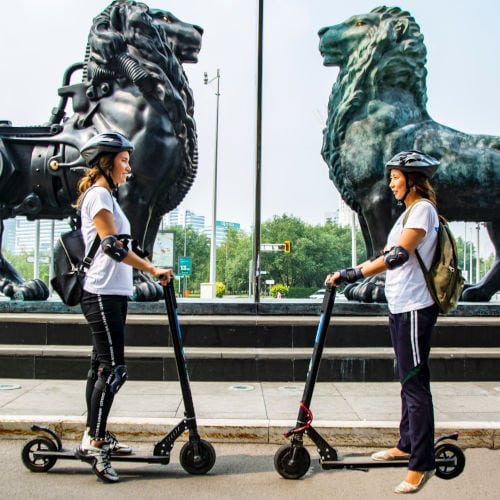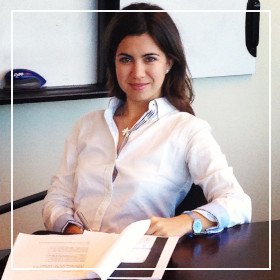On a chilly afternoon in April of 2016, Lana and I were about to embark on a ride through Saint Petersburg’s bustling downtown, so she was instructing me how to operate a Segway scooter: “You control it by leaning forward, backward, and sideways.” Sensing my unease around the stiff machine, she comforted me: “Listen, you just need to trust your body and slide.” I was silently examining Lana’s honey-colored eyes and freckles, while contemplating how to simultaneously slide and listen to her. She smiled, revealing a charming gap between her front teeth: “You’ve got this! Let’s go. I will tell you a story about how a young woman from Kazakhstan conquered Russia.”
I got on a scooter and followed Lana’s tall silhouette down the Konnogvardeyskiy boulevard toward the Nevsky prospect, overtaken by the rush hour. She moved confidently, knowing well what it meant to “trust [her] body and slide.” She had learned how to synchronize her bodily movements with the boat, rowing oars, and the bodies of her teammates during her professional career in rowing which began in her hometown of Temirtau in Kazakhstan. “How were those years for you?”, I asked Lana, trying to catch up with her. “Oh, life was in full swing!”, she said loudly so I could hear her past the traffic noise, “training sessions, friends and romantic adventures in high school, and a decent performance at the 2004 youth rowing championship in Japan.”
Listen, you just need to trust your body and slide.
After sliding down the streets of Saint Petersburg’s downtown for some time, we parked our scooters by a bridge and silently watched the Neva River shed her ice armor. The descending sun painted the buildings around us in gold and pink: “It was her [Lana’s mother’s] decision to move here, not mine. Saint Petersburg has never become my city,” Lana told me, reflecting on her family’s sudden move from Temirtau in 2009 in response to rising Kazakh nationalism and limited professional opportunities for non-Kazakhs, as Lana’s mother perceived it. “Hmm, I see…And [what about] Islam?”, I asked her, watching her fix her hijab, slightly loosened by the ride and the wind from the river. “At one point, we [teammates and Lana] were on the edge psychologically from trainings and conflicts… so we went on a team retreat to Egypt… and there I had my first vision… It was so powerful and overwhelming… I felt as though a ball of fire entered my body. I took it as my first encounter with Allah. So, it was in 2012 when my career in competitive sports ended and my journey as a Muslim began.” I listened to her and smiled recalling my first trip to Egypt, after which my life also took an unexpected turn.
Lana squinted her eyes at the glowing dome of Saint Isaac’s Cathedral and shivered from a sudden gust of wind from the river: “You know, I slide through life [skolzhu po zhizni],” she said turning her face to me, “slip through [proskalzivau] everywhere. This is my life strategy. Sometimes it works well and other times it does not. When the strategy is unsuccessful, it becomes an experience for me to learn from.” On the subway ride back to my apartment, I scribbled down some notes, pausing to think about “sliding through life”. Its exact meaning escaped me, but the sentiment felt very familiar. That night I looked up “sliding” in the dictionary to find some definitions: “moving smoothly along a surface”, “passing quickly and unnoticed”, but also “becoming dislocated” and “slipping or falling by loss of footing.” Like me, Lana was a child of the Soviet collapse, so sliding as a life strategy resonated with me. In one way or another, we had to learn how to navigate complex postsocialist terrains with their open avenues and dead ends. And so, she “traversed” and “coasted over,” “lost ground” and “descended.” As we became closer over time, I realized how Lana was also “sliding” through her newly embraced religion. However, I will leave this story for another time…
We parked our scooters by a bridge and silently watched the Neva River shed her ice armor.
Later that evening, we dropped off the scooters at the small tourist firm where Lana worked and walked to a sushi restaurant to thaw up a little and eat. She shared bits from her family history: “My grandmother grew up in an orphanage because her mother died from plague after fleeing her abusive husband with another man. After graduating from a vocational school, my grandmother left Russia for Kazakhstan to join the construction of the Magnitka, one of the largest metallurgical complexes in the Soviet Union. I do not know much about my biological father, apart from the fact that he was of German descent. Germans were exiled to Kazakhstan during World War II. My mother’s first husband was abusive, so she married my stepfather, a hen-pecked man [podkabluchnik]. I think there is a program stitched in my genes [zashita v genah] and I am trying to make sense of it.” I wondered to myself—but did not ask Lana— whether other women in her life were also “sliding through life.”
A few months after our first ride together, Lana abruptly left her job at that small tourist company and moved to Sri Lanka with a man she had met online. I was out of town at the time, so she sent me a few photos through WhatsApp – she and her husband rode scooters after their religious ceremony (nikah) in exact same location as we did in April. “Off she goes, sliding again”, I smiled to myself, looking at the photo of Lana and her husband in their Colombo-bound airplane. “Swoosh!”
Like me, Lana was a child of the Soviet collapse.
Right before the COVID-19 pandemic began, Lana and I were on a WhatsApp video call. I was in the United States, and she was in Saint Petersburg with her two daughters, settling anew in her old apartment and looking for a job. “My husband and his family stepped on me [nastupili na menya]. Imagine a river, whose flow is restricted by stones. Under pressure, it will overflow or flow in another direction, right? So, I took the girls and we left for Russia”, she spoke quietly as not to wake up her daughters. Lana told me how life in Sri Lanka turned out to be more difficult than she had anticipated: she was sucked into a vortex of a complicated family dynamic, professional and spiritual self-search, and motherhood. As she tried to parent and keep the house running, while coaching a team of young female rowers for the 2019 championship in Thailand, her visons reoccurred, leading to a few instances of hospitalization. Relations with her husband became disbalanced, too. At that time, “sliding through life” required reorienting herself to avoid capture and prompted her to ride along, with, and against life’s relentless tides.
I often remember how Lana and I rode scooters together on that chilly afternoon in April of 2016 and wonder how differently we deal with life’s uncertainties. One way is to take cautious steps along a well-trodden path toward a promise of safety and gratification. No matter how carefully we tread, however, nothing on that path is guaranteed. Another way is Lana’s “sliding through life”, swirling around its messy paths, and opening oneself up to unexpected border crossings, visions, and sensations. She taught me that sliding often invites us to navigate the world from a position of the unknown and without an endpoint. It renders us pervious, unbound, and vulnerable to whatever life holds and whoever we encounter on its winding paths. This way of moving through life is in fact familiar to many of us, as we try to make sense of and live with the ever-increasing instability around us. Sliding then becomes an intuitive method, although without a specific formula. “Listen, you just need to trust your body and slide”, I keep hearing Lana’s words reverberating in my ears, as she instructed me how to ride a scooter.
Sliding often invites us to navigate the world from a position of the unknown and without an endpoint.
As ethnographers, we also slide through fieldwork. We often begin our research with a firm set of questions and intentions to collect data on a given topic. However, after a while, we begin to follow our interlocutors, objects, ideas, and bodies, and arrive in places, not expected or even desired. The field invites us to trust and improvise, while remaining grounded and balanced. It also urges us to hold multiple visions – frontal, peripheral, and rear – and forms of attention, most importantly to the possible. Indeed, as a “practice of critical observation and imagination”, ethnography allows us to “trace the outlines of a possible world within the seams of this one” (Pandian 2019, 4). As I learned from my fieldwork, this emergent world coheres in the interstices of the field. To explore its uneven surfaces and meandering paths an ethnographer learns how to slide.
Among many things, Lana’s invitation to ride scooters encouraged me to embrace my ethnographic intuition and let myself wander, get lost, and become entangled with – and ultimately transformed by – the gifts of the field. For that, I will remain grateful to her and her “sliding” metaphor, which so aptly captures a particular way of being, doing, and knowing.
Sources cited:
Pandian, Anand. A Possible Anthropology: Methods for Uneasy Times. Durham, NC: Duke University Press, 2019
Featured image by Marat Mazitov on Unsplash





